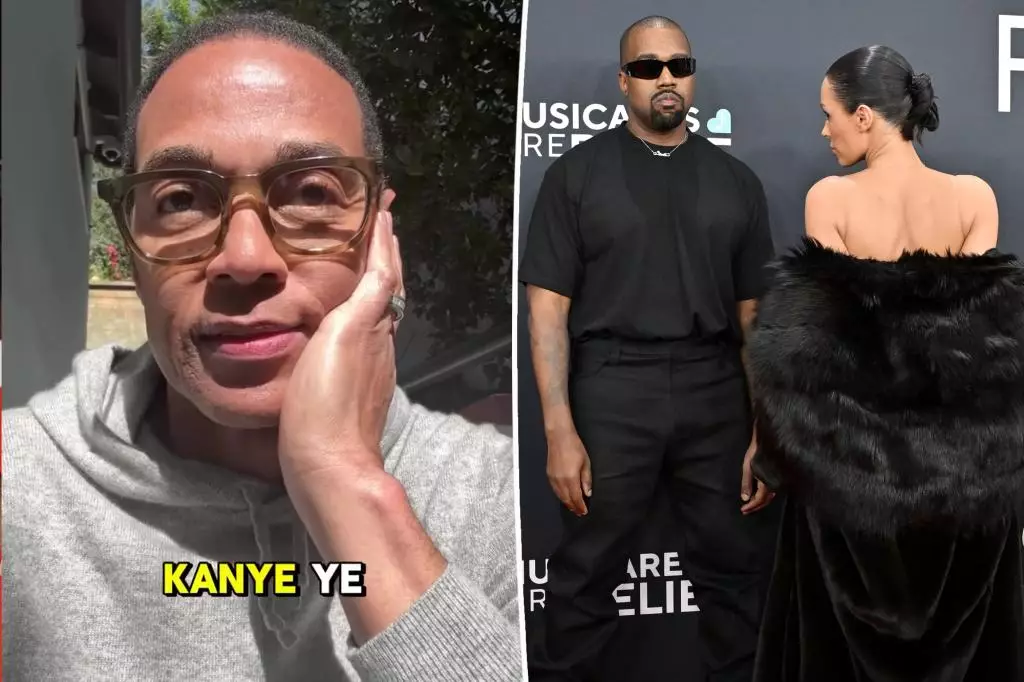The recent outburst from Kanye West, labeling Don Lemon a “coon” over a rumor regarding his and Bianca Censori’s ousting from the Grammys, has ignited a heated debate about respect within the Black community and the role that media figures play in celebrity culture. This incident encapsulates the complexities surrounding race, accountability, and the thin veil of respect that often separates public figures from journalists in today’s media landscape.
When Kanye West employed the term “coon” in reference to Don Lemon, he not only aimed to insult but also invoked a term deeply rooted in the historical and sociocultural context of racism. The implications of such language are profound and divisive. Lemon’s reaction underscores the awareness required when addressing issues of race; he stated, “We’re both black men. You know what that word means in our community.” This acknowledgment is crucial, as it illustrates the responsibility inherent in public discourse, particularly between two influential Black figures. West’s casual usage of derogatory language reflects a disregard for the historical weight it carries, which can be perceived as an attack rather than a critique.
The struggle for respect among peers, especially in the context of race, manifests notably in this exchange. Lemon’s insistence on mutual respect points to a broader expectation within the community that members ought to uplift rather than demean one another.
Don Lemon clarified his intentions regarding the rumor of West and Censori being ejected from the Grammys, asserting that his broadcast was not the origin of the narrative; instead, it was a reflection of what he had heard. The blurred lines between rumor and fact in entertainment reporting often become fodder for celebrity rebukes, as we see in West’s reaction. His immediate pivot to blaming Lemon indicates a desire to deflect accountability for his public appearance and perhaps the controversial nature of his attire alongside Censori.
Interestingly, Lemon’s review of their red carpet moment highlights the intricate dance between celebrity and media. He stated, “Kanye’s a master marketer,” recognizing that West’s provocative appearance and the ensuing buzz operate within a certain narrative that he has meticulously crafted over the years. This acknowledgement not only sheds light on West’s ability to generate publicity but also illustrates the challenge journalists face when walking the tightrope of sensationalism versus responsible reporting.
In the digital age, social media serves as both a platform for expression and a breeding ground for misunderstanding. West’s Instagram post denouncing Lemon, combined with Lemon’s subsequent clarification, demonstrates how quickly narratives can become weaponized online. Each claim and counterclaim can spiral, transforming minor conflicts into public spectacles that distract from larger issues at play.
This incident exemplifies how personal grievances are often amplified within a public forum, leading to a barrage of commentary from fans and critics alike. The fallout can have far-reaching effects, leading to discussions about integrity in journalism and the consequences of irresponsible celebrity behavior.
The Don Lemon and Kanye West conflict serves as a poignant reminder of the intricacies involved when race, celebrity, and media intersect. Whether it’s the use of derogatory terms or the circulation of unverified information, each element carries implications that resonate beyond the initial comment. As figures in the public eye, both Lemon and West hold significant influence, and their exchanges highlight the necessity for more thoughtful dialogue.
In an era marked by a quest for authenticity and respect, it’s essential that individuals in media and celebrity leverage their platforms to create an environment conducive to upliftment rather than division. The incident underscored the need for a more reflective approach in interactions that navigate the complex waters of cultural identity, public perception, and personal accountability.

